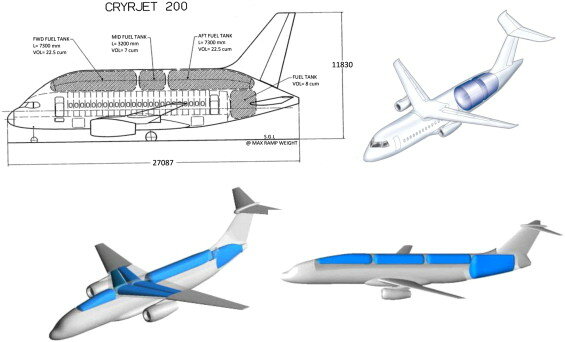It is not all about efficiency off the fuel production but also about fuel transport and storage. A wind turbine in Chile or on a remote island in the southern hemisphere can easily produce four times more energy than a wind turbine in Germany, but therefor you need a way to store and transport the energy (batteries are not suited for that). Also, the weight of the energy storage is important, if half of the weight is used for energy storage (see Alice) you need more energy for the same useful load than with a conventional propulsion system which might need aroud 25 % of the total weight.
You are using an out of date browser. It may not display this or other websites correctly.
You should upgrade or use an alternative browser.
You should upgrade or use an alternative browser.
Hydrogen-Powered Aircraft Projects
- Thread starter hesham
- Start date
- Joined
- 26 May 2006
- Messages
- 32,683
- Reaction score
- 11,906
Attachments
I like this special shape, It looks great! Thank you for sharing!
This raises questions for the future of air travel. High-speed electric trains might be a more affordable approach for routine intercity travel. The electric power needed to generate hydrogen would go a lot farther powering trains.All fuels do; it's just that the energy costs for production of coal, crude oil, and biofuels are included in their costs. The questions are, first, are the inefficiencies low enough to make hydrogen economically viable, and, second, are the net environmental damages less than directly using fossil fuels.The biggest problem with hydrogen is where do you get it from? Hydrolysis consumes more energy than it produces in the hydrogen fuel.
For ground-based transport, the answer to the first is "probably not," as battery power is viable for most road vehicles and electrified railways -- even transcontinental lines -- are very well-proven technology.
Similar threads
-
-
AFRL advanced supersonic fighter and transport aircraft
- Started by hesham
- Replies: 2
-
Rockwell D-516 STOL tactical transport aircraft of 1973
- Started by hesham
- Replies: 4
-
North American X-15 - Variants and Projects
- Started by hesham
- Replies: 27
-
Boeing MER/TER & Integrated Conformal Carriage projects
- Started by hesham
- Replies: 3


